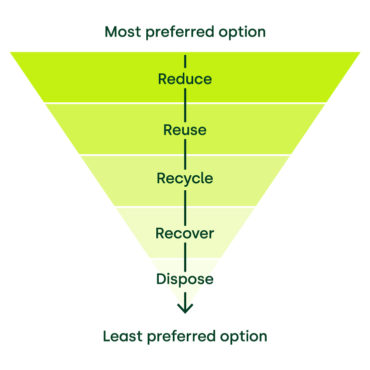
Views • 24/02/2021 • 4 minutes read
Waste management makes business sense. Here’s why
Stefani Kopach from the Sustainability team at MAPP, explains why it is important for MAPP to monitor the collection, transportation, processing and disposal of waste for all managed asset portfolios.
Waste is sadly inevitable in almost any business. However, we can prevent toxic foreign materials from ending up in our rivers and oceans with cost-effective and environmentally-friendly waste disposal. This in turn saves species under threat, reduces the blocking of sewage systems and avoids releasing greenhouse gases. As such, waste management and the safe disposal of waste is vital for the environment.
Reducing waste is an integral part of the circular economy, the aim of which is to not create waste in the first place. Making new products requires a lot of materials and energy. Raw materials must be extracted from the earth in order for the products to be fabricated and transported to the destination where they are being sold.
The concept of reuse has been building momentum over the past few years and has accelerated thanks to COVID-19. Many people, regardless of their income or buying power, are buying clothes, home appliances and other goods second-hand to minimise environmental impact.
Reduction and reuse are seen as the most effective ways to save natural resources, protect the environment and save money. Other benefits include energy saving, GHG (greenhouse gas) reduction, pollution prevention and waste reduction.
(For further information on the circular economy, we recommend this video from the Ellen MacArthur Foundation.)
The following are tips for great ways to reduce and reuse, rather than creating additional waste.
1 |
Buy usedYou can find everything from clothes to building materials at specialised reuse centres. |
2 |
Look for products that use less packagingExchange the apples in plastic packaging for ones without. |
3 |
Buy reusable over disposable itemsLook for items that can be reused, instead of those described as single-use. |
4 |
Maintain and repair productsMany items can be repaired; clothing, tires and appliances for example. Maintaining as well as fixing products means that they won’t have to be thrown out and replaced as frequently. |
5 |
Borrow, rent or share items that are used frequentlyCompanies exist that enable you to borrow, rent or share occasional use items such as tools or furniture. |
Where it is not possible to reduce or reuse waste, then we must look at the best possible and most cost-effective, sustainable solution. To do this, we take into account the waste hierarchy:

There are three ways to process waste:
1
Recycling
The most well-known and desirable process, converting waste into new materials and objects.
2
Incineration
A high temperature waste treatment (also known as “thermal treatment”), which converts waste into gas and heat.
3
Landfill
It is hoped that waste disposed in landfill will eventually rot away, decompose and reabsorb into the earth. However, not all waste in landfill is biodegradable, so some waste will never fully decompose. Additionally, the decomposition process can produce methane gas, which is one of the most dangerous explosive gases, contributing to global warming.
From these three options, it is clear that landfill is the least desirable pathway as it causes the greatest environmental impact. For this reason, MAPP sees it is as essential to maximise the diversion of waste from landfill.
MAPP, alongside our two outsourced waste broker companies – New Star and ACM, offer multiple waste related services, including waste reporting. To satisfy clients’ and stakeholders’ requirements, the Sustainability team records and reports waste for all MAPP managed properties. This helps us and our clients to assess overall waste performance and subsequently improve it via reducing or segregation techniques.
And finally, waste management not only has a positive environmental impact but also brings other benefits to a business.
Waste management can:
1
Make you more profitable
Optimising supply chains or better controlling stock inventory provides opportunities to increase revenue.
2
Boost your company’s reputation
Customers will see you as a sustainable and responsible company, caring about the society, the environment and the future.
3
Reduced production costs in the long run
Recycling helps to conserve natural resources and money.
4
Increased safety in the workplace and community
Degrading waste can be toxic for your employees by polluting their environment.